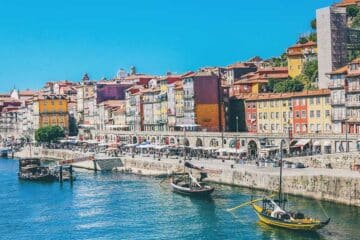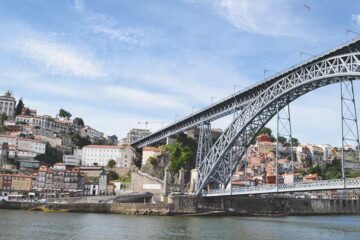Welcome to your Portugal Backpacking guide. Your roadmap to a land of sunlit shores, historic cities, and rolling vineyards. This guide is key to discovering a country rich in culture and natural beauty, offering everything from the vibrant streets of Lisbon and Porto to the serene landscapes of the Douro Valley and the Algarve’s pristine beaches. Portugal is also a haven for backpackers seeking adventure on a budget, promising experiences that blend urban exploration with the tranquility of nature.
Guide Index
What to Expect: A Simple Overview
Portugal is a compact yet incredibly diverse country. It offers a wide range of experiences. From the bustling streets of Lisbon and Porto to the tranquil beauty of the Algarve’s beaches and the amazing Douro Valley’s vineyards. Expect to be charmed by the blend of medieval architecture, contemporary art, and lively markets.
Hostels in Portugal are a reflection of the country’s warm hospitality and backpacker-friendly atmosphere. Ranging from budget-friendly dorms in centuries-old buildings to boutique hostels with private rooms and modern amenities, the hostel experience in Portugal is awesome.
Travel Costs: Detailed Breakdown
Here’s a detailed breakdown of travel costs to help you plan your Portuguese adventure.
Suggested Budget per Person
- Low: €40 – €65 per day
- Middle: €90 – €160 per day
- High: €200+ per day
Detailed Costs
Accommodation:
- Low: Hostel dorms range from €15 to €25 per night, offering a budget-friendly way to meet fellow travelers.
- Middle: Mid-range hotels, guesthouses, or B&Bs typically cost between €60 and €130 per night, blending comfort with a touch of local charm.
- High: Luxury hotels or upscale apartments start at €180, with prices climbing in prime locations and for accommodations with premium amenities.
Restaurants:
- Low: Enjoy traditional pastries like pastéis de nata for around €1, sandwiches in local cafes for about €3 to €5, and full meals in modest restaurants for €10 to €15 per person.
- Middle: A heartier meal at a mid-range restaurant can cost €15 to €35, allowing you to savor Portugal’s rich culinary heritage.
- High: Fine dining experiences in Portugal begin at €45, with costs varying greatly depending on the restaurant’s prestige and location.
Tips for Enjoying Cheap Food in Portugal
- Tascas: These small, traditional eateries offer hearty Portuguese dishes at wallet-friendly prices. It’s a fantastic way to immerse yourself in the local dining culture while enjoying delicious, inexpensive meals.
- Petiscos: Portugal’s answer to tapas, petiscos are small, savory dishes that are perfect for sharing. Visiting petiscos bars allows you to try different local flavors without spending a lot.
Where You Can Find the Most Affordable Groceries
The cheapest supermarkets are Pingo Doce, Continente, and Lidl. You’ll find them all around Portugal.
Also, in the North of Portugal, you’ll find the Spanish supermarket Mercadona, one of my favorite supermarkets in the world as their hummus and Spanish omelette are excellent.
Things to See and Do
Absolute Top Cities
Lisbon: The capital city, known for its hilly, cobblestone streets, iconic tram 28, and the historic Belém district, where you’ll find the Jerónimos Monastery and the Tower of Belém.
Porto: Famous for its stunning riverside district, Ribeira, its wine cellars, and the majestic Dom Luís I Bridge.
Coimbra: Home to one of the oldest universities in Europe, offering a blend of medieval charm and vibrant student life.
Faro: The gateway to the Algarve’s breathtaking beaches, historic old town, and the Ria Formosa Natural Park.
Historical Landmarks
Mosteiro dos Jerónimos, Lisbon: A masterpiece of Manueline architecture, this monastery is a UNESCO World Heritage site and a symbol of Portugal’s Age of Discovery.
Torre de Belém, Lisbon: Standing at the mouth of the River Tagus, this fortified tower has guarded Lisbon since the 16th century and is a testament to the country’s maritime heritage.
Palácio Nacional da Pena, Sintra: This Romanticist castle set amidst the lush hills of Sintra showcases a vivid mix of architectural styles, surrounded by picturesque gardens.
Natural Wonders
Douro Valley: Renowned for its terraced vineyards that produce the famous Port wine, this valley offers stunning landscapes and river cruises.
Ponta da Piedade, Lagos: Spectacular cliffs, sea arches, and hidden beaches define this natural wonder in the Algarve.
Parque Nacional da Peneda-Gerês: Portugal’s only national park, offering rugged hills, verdant valleys, and a rich diversity of wildlife.
Cultural Experiences
Fado Music: Experience the soulful sounds of Fado in one of Lisbon or Porto’s traditional Fado houses. This UNESCO-listed music genre is a profound expression of Portuguese melancholy and longing.
Port Wine Tasting in Porto: Visit the wine cellars of Vila Nova de Gaia for a taste of the world-renowned Port wine, learning about its history and production process.
Admire the Tiles Art: Discover the beauty of Portuguese tiles, Azulejos, that decorate buildings, churches, and palaces throughout the country. There is also a National Tile Museum in Lisbon – a great place to learn more about it deeply if you are interested. My recommendation? Join a workshop to make your tile, it is a cool experience.
Itinerary Ideas
Crafting the perfect itinerary for backpacking through Portugal using public transportation is easy. You’ll be able to visit its historic cities and breathtaking landscapes, even if you’re short on time. Here are itinerary ideas for both 1 week and 2 weeks.
1-Week Itinerary: Lisbon, Sintra, Porto
Day 1-3: Lisbon
- Start your adventure in Lisbon. Explore the Alfama district, ride Tram 28, and visit the Jerónimos Monastery and Tower of Belém. Don’t miss experiencing Fado music in the evening.
- Day trip to Belém for the Monastery, the Tower, and to try the original Pastéis de Belém.
Day 4: Sintra
- Take a day trip to Sintra from Lisbon (40 minutes by train). Visit the Pena Palace, Moorish Castle, and wander through the charming town. Return to Lisbon in the evening.
Day 5-7: Porto
- Catch a train to Porto (approximately 3 hours). Explore the Ribeira district, take a port wine tour in Vila Nova de Gaia, and enjoy the views from the Dom Luís I Bridge. Visit the São Bento station to see its azulejo murals.
- Consider a half-day trip to Matosinhos for its beaches, accessible by the metro from Porto.
2-Week Itinerary: From North to South
Day 1-3: Porto
- Follow the 1-week itinerary for Porto, with an extra day to explore more of the city’s museums and perhaps catch a concert or local event.
Day 4: Aveiro
- Visit Aveiro, known as the “Venice of Portugal,” for its canals and colorful moliceiros boats. It’s a short train ride from Porto.
Day 5-6: Douro Valley
- Take a day trip to the Douro Valley from Porto. While a car offers more flexibility, there are organized tours or train options that allow you to experience stunning landscapes and wine tastings.
Day 7-8: Coimbra
- Travel to Coimbra (about 2 hours by train from Lisbon), known for its ancient university and stunning library. Explore the old cathedral and the botanical garden.
Day 9-11 : Lisbon
- Follow the 1-week itinerary for Lisbon, including a day trip to Sintra.
Day 12-14: The Algarve
- Head south to the Algarve (Faro is about 3 hours from Lisbon by train). Spend your days exploring the stunning beaches, sea caves, and enjoying the coastal scenery. Lagos, Albufeira, and Faro offer great bases with easy access to public transport for beach hopping.
Where to stay on a Budget in Portugal
In Portugal, the hostel game is indeed strong. Portugal’s hostels are renowned for their quality, variety, and the backpacker-friendly atmosphere they foster. Whether you’re a solo traveler looking to meet fellow wanderers or a group of friends on a budget, Portuguese hostels provide a welcoming base for exploring the country.
Few Hostels we love
Passenger Hostel, Porto: Located in the iconic São Bento train station, The Passenger Hostel offers a luxurious yet affordable stay, blending historic charm with modern design and comfort. It’s renowned for its exceptional facilities, including a communal kitchen, library, and lounge areas, making it a top choice for travelers seeking a unique and upscale hostel experience in the heart of Porto.
Penedo da Saudade Suites & Hostel, Coimbra: Nestled in a tranquil area with stunning views of the city, Penedo da Saudade Suites & Hostel combines the comfort of modern accommodations with the warmth of Portuguese hospitality. It’s perfect for those looking to explore Coimbra’s rich academic history and vibrant cultural scene.
Sunset Destination Hostel, Lisbon: Boasting a prime location on the rooftop of the Cais do Sodré train station, Sunset Destination Hostel offers travelers breathtaking views of the Tagus River and Lisbon’s skyline. With its vibrant atmosphere, outdoor pool, and themed parties, it’s an ideal spot for backpackers looking to mix relaxation with socializing in Portugal’s capital.
Bura Surfhouse, Lagos: A haven for surfers and beach lovers, Bura Surfhouse in Lagos is more than just a place to stay; it’s a lifestyle. With its laid-back vibe, regular BBQ nights, and surf lessons, guests can enjoy the ultimate beach holiday while making new friends in the Algarve’s sunny paradise. This is one of the best hostels in Portugal.
How to get around Portugal
Navigating Portugal is easy as it has an efficient public transport system.
Metro
Primarily serving Lisbon and Porto, the metro systems in these cities are fast, reliable, and the easiest way to navigate their bustling streets. Both metros offer extensive coverage, with frequent services that connect major tourist attractions, accommodation areas, and transport hubs.
Trains
Portugal’s national railway, Comboios de Portugal (CP), offers an extensive network that connects not only major cities like Lisbon, Porto, and Coimbra but also extends to the Algarve in the south and the Douro Valley in the north. Trains range from high-speed services, such as the Alfa Pendular linking Lisbon and Porto, to regional and intercity trains that offer a scenic way to explore the country’s diverse landscapes.
Buses
For areas not served by trains or to reach more remote locations, buses are an excellent option. Companies like Rede Expressos and Rodonorte operate extensive long-distance bus services that cover the entire country, including small towns and rural areas. Buses are often more affordable than trains and can be a more direct way to reach certain destinations.
Trams and Funiculars
In Lisbon, the iconic yellow trams are not just a tourist attraction but also a practical way to navigate the city’s steep hills, especially the famous Tram 28 route. Funiculars, like the Elevador de Santa Justa, offer unique and charming ways to climb the city’s slopes.
Traveling by Car
While Portugal’s public transport system provides excellent coverage and convenience, renting a car opens up a new world of possibilities for exploration. Having a car allows you to discover off-the-beaten-path villages, secluded beaches, and stunning natural parks at your own pace. It’s particularly useful for exploring regions like the Algarve’s coastline, the mountainous interior, or the wine regions where public transport may not reach all the hidden gems.
Best Time to visit Portugal
Choosing the best time to visit Portugal depends largely on your preferences for weather, crowd sizes, and specific events or activities you wish to experience. Portugal enjoys a mild climate year-round, making it a great destination at any time. Here’s a breakdown to help you decide when to plan your backpacking trip:
Spring (March to May)
- Weather: Mild temperatures and blooming landscapes. It’s an excellent time for outdoor activities like hiking and sightseeing.
- Crowds: Lower than in summer, making it a good time to explore popular destinations without the peak season crowds.
- Highlights: Festivals such as Lisbon’s IndieLisboa (International Independent Film Festival) in April and the Flower Festival in Madeira.
Summer (June to August)
- Weather: Warm to hot, perfect for beach holidays and coastal activities. The Algarve and coastal areas are particularly appealing.
- Crowds: This is peak tourist season, especially in coastal areas and major cities. Book accommodations and transport in advance.
- Highlights: Popular music festivals like NOS Alive in Lisbon and the Medieval Fair in Óbidos. St. John’s Festival (Festa de São João) in Porto in late June is a must-experience.
Autumn (September to November)
- Weather: Warm temperatures continue in September, gradually cooling down. It’s harvest time in wine regions, ideal for wine tours and tastings.
- Crowds: Fewer tourists than in summer, making it a great time to explore cities and attractions at a more relaxed pace.
- Highlights: The Douro Valley is especially beautiful as the vineyards change color. Lisbon & Sintra Film Festival in November attracts cinema enthusiasts.
Winter (December to February)
- Weather: Cooler, especially in the north, but still mild compared to much of Europe. The south, particularly the Algarve, remains relatively warm.
- Crowds: Lowest tourist numbers, except during Christmas and New Year holidays. Expect excellent deals on accommodations.
- Highlights: Christmas markets and festivities in major cities. Ideal for city breaks and cultural exploration without the crowds.
National Holidays and Important Events
- Carnival (February/March): While not a national holiday, Carnival is widely celebrated, especially in regions like Madeira and the Algarve. Expect colorful parades, costumes, and festivities reminiscent of Brazil’s famous Carnival.
- Freedom Day (Dia da Liberdade), April 25: Commemorates the 1974 Carnation Revolution that ended decades of dictatorship. Celebrations include parades and cultural events, particularly in Lisbon.
- Labor Day (Dia do Trabalhador), May 1: A public holiday marked by parades and events advocating for workers’ rights. It’s a day of unity and celebration across the country.
- Portugal Day (Dia de Portugal), June 10: Celebrates Portugal’s national identity, literature, and communities worldwide. Official ceremonies, military parades, and cultural events take place, especially in Lisbon.
- St. Anthony’s Day (Dia de Santo António), June 13: Particularly celebrated in Lisbon, where St. Anthony is the patron saint. The city comes alive with processions, traditional music, and sardine festivals.
- St. John’s Festival (Festa de São João), June 23-24: Especially significant in Porto, this festival involves street parties, fireworks, and the release of sky lanterns. It’s one of Portugal’s most vibrant celebrations.
- St. Peter’s Day (Dia de São Pedro), June 29: Celebrated in various regions, with particularly lively festivities in cities like Sintra and Évora, involving parades and dancing.
Many Music festivals might affect accommodation availability. Most of them are in summer:
- Primavera Sound Porto: Porto (June)
- Rock in Rio Lisboa: Lisbon Biennially. (June in odd-numbered years)
- NOS Alive: Oeiras, near Lisbon. (July)
- Super Bock Super Rock: Meco, Sesimbra, near Lisbon. (July)
- Boom Festival: Idanha-a-Nova Biennially. (August in even-numbered years)
- Meo Sudoeste: Zambujeira do Mar. (August)
- Vodafone Paredes de Coura: Paredes de Coura. (August)
Backpacking Essentials & Safety Tips
Safety Tips
Stay Aware in Crowded Areas: Like any popular tourist destination, keep an eye on your belongings in crowded places such as Lisbon’s Tram 28, beaches in the Algarve, or during festivals.
Use Reputable Transportation: Always opt for official taxis or verified transportation apps. When using public transport, be mindful of your surroundings and belongings.
Cultural Norms
Greetings Matter: A simple “Bom dia” (Good morning), “Boa tarde” (Good afternoon), or “Boa noite” (Good evening) can go a long way in showing respect. Physical greetings involve two kisses on the cheeks among friends.
Dress Appropriately: While Portugal is relatively relaxed about dress codes, modesty is appreciated, especially in religious sites. Beachwear is reserved for the beach.
Things Not to Do
Don’t Disrespect Historical Sites: Portugal is rich in history. Be mindful and respectful when visiting historical sites, monuments, and churches. Avoid climbing on ruins or taking prohibited photographs.
Don’t Forget to Validate Your Transport Ticket: In metro and train stations, always validate your ticket before boarding to avoid fines.
Resources and Planning
Here’s a guide to useful apps and money-saving tips for your Portuguese adventure.
Useful Apps
Find all our favorite websites and apps for travel planning here.
Comboios de Portugal (CP): For train schedules and tickets across the country. It’s invaluable for planning longer journeys and exploring regions outside major cities.
Metro Lisboa and Metro do Porto: Essential for navigating the metro systems in Lisbon and Porto, providing maps, schedules, and fare information.
myTaxi or Uber: Reliable taxi and ride-sharing apps for safe and convenient transportation, especially late at night or when public transport isn’t available.
Save Money Tips
Leverage Public Transport: Investing in a Viva Viagem card in Lisbon or an Andante card in Porto for unlimited public transport can save you a lot of money on getting around.
Stay in Hostels: Hostels not only offer affordable lodging but often provide free amenities like Wi-Fi, breakfast, and kitchen facilities, allowing you to prepare your meals.
Eat Like a Local: Opt for the “prato do dia” (dish of the day) at local restaurants for a filling, budget-friendly meal. Also, markets and local bakeries are great spots for inexpensive, fresh food.
Free Attractions: Many of Portugal’s museums and cultural sites offer free admission on certain days of the month. Additionally, exploring public parks, gardens, and historical neighborhoods costs nothing and can provide deep insight into the country’s heritage.
Avoid Peak Season: Traveling during the shoulder seasons (spring and autumn) can lead to lower prices for accommodation and flights, as well as fewer crowds.
Bring a Reusable Water Bottle: Tap water in Portugal is safe to drink. Save money and reduce plastic waste by refilling your bottle.
Conclusion
As you can see, Portugal’s true magic isn’t in guidebooks. It’s in the taste of freshly grilled fish by the seaside, the sound of Fado that stirs deep emotions in Lisbon’s old taverns, and the sight of terraced vineyards that sculpt the Douro Valley’s landscape.











